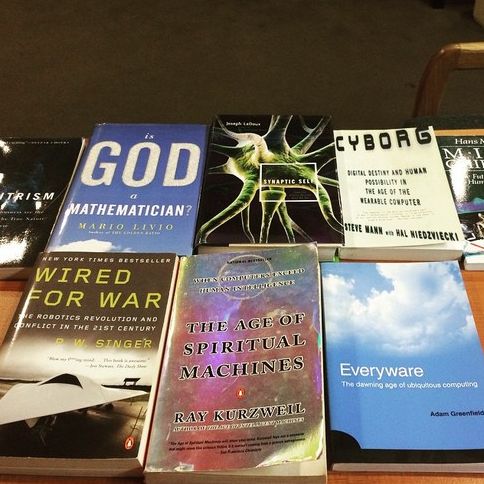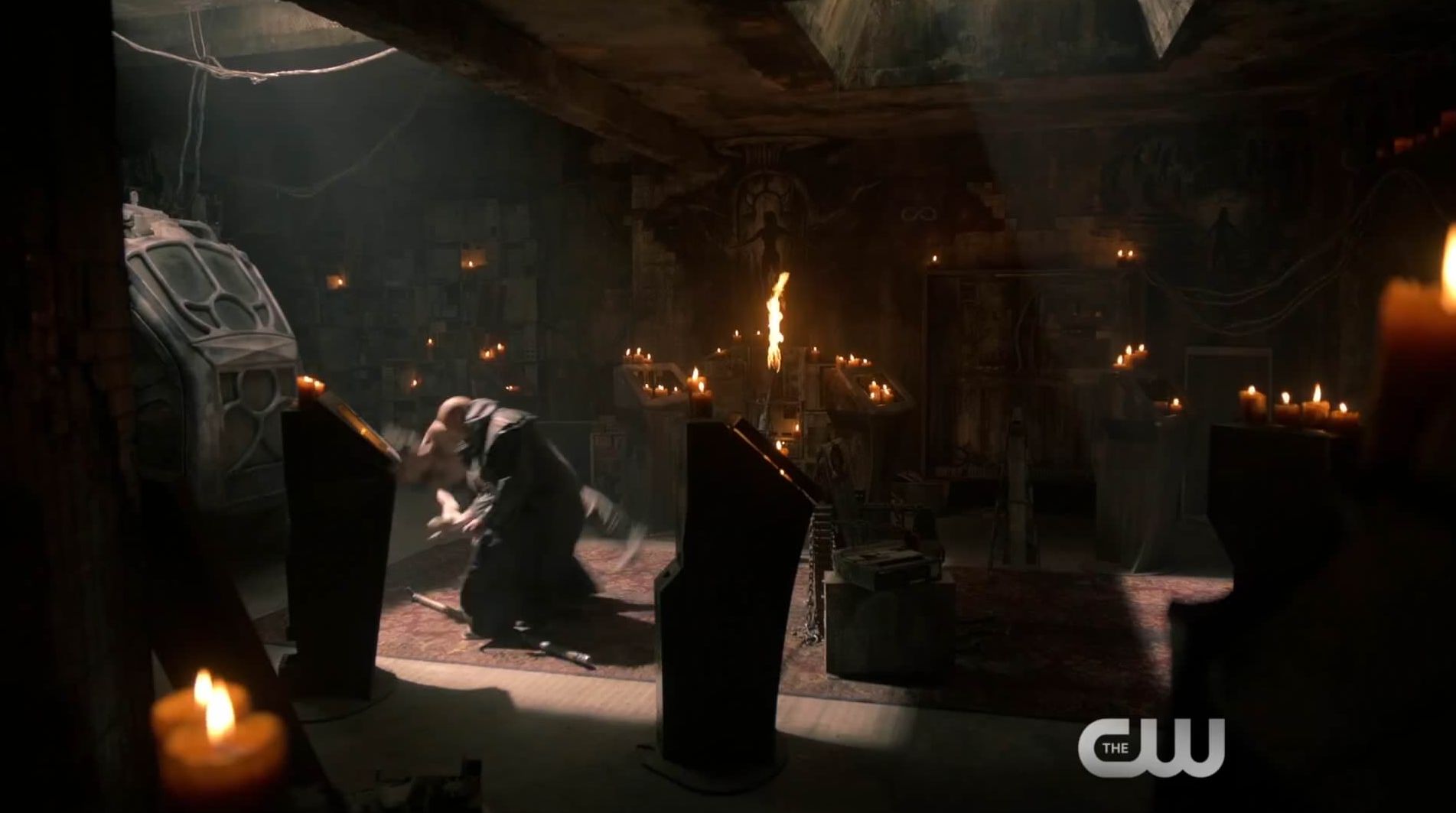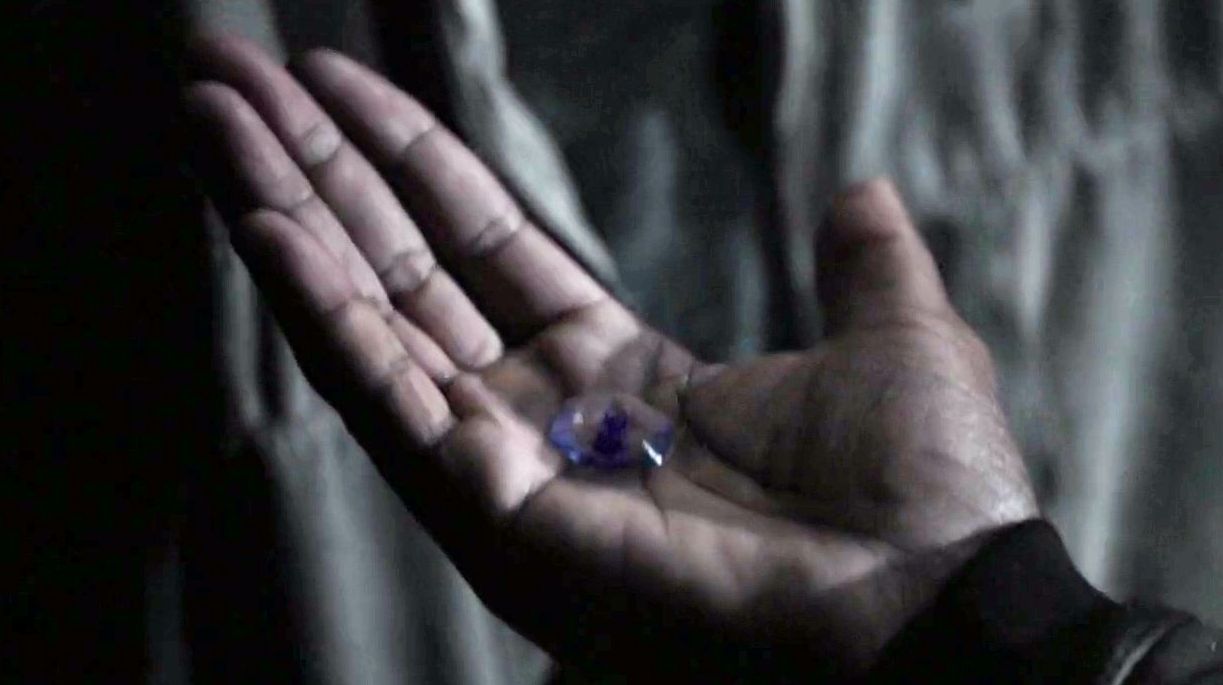
The 100 Season 3: The A.L.I.E. Theories
 The last episode of season two of The 100 aired in March, and finally—finally!—season three starts on Thursday. Each fan finds their own way to cope with a seemingly endless hiatus. Gif-sets on Tumblr and fanfic on AO3 make it all more bearable, but my favorite hiatus pastime is theorizing. [Warning!! Spoilers for ALL released trailers, teasers, and previews]
The last episode of season two of The 100 aired in March, and finally—finally!—season three starts on Thursday. Each fan finds their own way to cope with a seemingly endless hiatus. Gif-sets on Tumblr and fanfic on AO3 make it all more bearable, but my favorite hiatus pastime is theorizing. [Warning!! Spoilers for ALL released trailers, teasers, and previews]
Much like Lost or Battlestar Galactica, The 100 is a fantastic show for theories on multiple levels. Political theory with the Grounder clans and the Sky People? Speculation on theology through Lexa’s statement to Clarke in season 2, episode 10: “When I die, my spirit will find the next commander”? Or how about taking a look at how trauma, both individual and in a group, affects not only individual relationships but also civilization building?
It’s all there! That’s what makes theorizing about The 100 fun and complex.
This post, however, is going to examine the hard sci-fi turn The 100 took in the last scenes of season two with the introduction of artificial intelligence, and how I believe the show will delve into transhumanism, genetics, and even, perhaps, theology.
let's back up a bit
In the last scenes of season two, Thelonius Jaha follows a drone to a well-kept white mansion. “Curiouser and curiouser,” he says, quoting Alice in Wonderland. Inside, the mansion is clean and bright with electric lights. Suddenly, a woman in a red dress appears before him. She is A.L.I.E., an artificial intelligence (”Your thoughts are chemical. Mine are digital,” she says) that has been sequestered inside the house for 97 years.
Not only that, A.L.I.E. has somehow acquired the nuclear warhead that Jaha crashed to Earth in. With shock and horror dawning on Jaha’s face, A.L.I.E. shows him the warhead and smiles, “We have work to do.”
It is a chilling scene, and completely unexpected. I’d wager that most of us thought that the City of Light would be an actual place (and it still might). Instead, we’re introduced to A.L.I.E., who (forgive me for the crossover with BSG) seems to have a plan. What is her plan? And more importantly, why?
terms and definitions
First, I’m going to lay out some foundational science and definitions. This will make it easier to discuss my actual show theories later in the post.
If you’re any fan of science-fiction, the ideas of artificial intelligence, the singularity, and transhumanism will be familiar to you. Recently a spate of movies like Ex Machina, Her, Uncanny, Transcendence and old favorite TV-shows like Battlestar Galactica have explored what the implications of AI on humanity will be.
Artificial intelligence is the field of science and technology that is concerned with developing machines that can think and behave like humans.
Transhumanism is a philosophical movement that encourages the merging of machines and humans. One of the most outspoken advocates is Ray Kurzweil, a futurist that Jason Rothenberg, The 100’s showrunner, has referenced several times. See the tweet below:
'@siIverarrowhead #the100 The Singularity Is Near by Ray Kurtzweil.— Jason Rothenberg (@JRothenbergTV) July 2, 2015
The Singularity is the idea that at some point in the near future, machines will catch up to human intelligence, and then start to improve upon themselves without our assistance. Kurzweil supposes this will happen in 2045, due in part to his “law of accelerating returns” which states unlike evolutionary change, which is linear, some technologies change exponentially, leading to profound progress in a short amount of time. An oft-cited example of this is computer chip size: the size of computer chips has decreased rapidly, but their computing power has increased. This would be crucial for the development of nano-technologies such as nano-bots that could enter the brain through our capillaries and connect our thoughts to the Cloud. (1)

Clearly, the writers are interested in these ideas for season three. But what shape will those ideas—which seem so dependent on technologies glaringly absent in the world of The 100 take? Moreover, how do they fit into the storytelling that The 100 uses, and what clues have been left?
through the looking glass
“Now here, you see, it takes all the running you can do, to keep in the same place. If you want to get somewhere else, you must run at least twice as fast as that!”—the Red Queen, Through the Looking Glass by Lewis Carroll
Jason Rothenberg, tweeting about the season two finale:
The Alice in Wonderland quote is very deliberate. We are through the looking glass now, folks. #The100 #The100Finale— Jason Rothenberg (@JRothenbergTV) March 12, 2015
Transhumanism is intimately tied to the field of genetics and neuro-plasticity. If people are to merge with machines, then our bodies and our DNA must make—and eventually will make—adjustments. We will evolve.
In genetics, there is a hypothesis of sexual evolution called The Red Queen’s hypothesis. Basically, an organism must coevolve at the same speed as its host organism or ecosystem to survive. Too slow of evolution, and it dies. Too fast, it dies as well. As the Red Queen says in Through the Looking Glass, the organism must run as fast as it can to stay in the same place.
In the context of The 100, the Mount Weather civilization immediately comes to mind. They sought safe haven from the nuclear apocalypse in a sealed bunker, never exposing their population to the environment above, and quite literally living like parasites off of the Grounders. They were unable to metabolize radiation, and thus went extinct when exposed to the outside world.
The Grounders, having evolved with the radiation and nuclear fallout, have survived. We don’t know the number for sure yet, but enough population to have different clans and a capital city.
To be sure, they didn’t evolve unscathed. Unfavorable mutations appear, both human and animal, as evidenced by Emori, Zoran, and forest-dude scuttling about in the underbrush. Those who are mutated, though, are ruthlessly excised from the gene pool and left for dead as babies. It’s a brutal way of ensuring that their DNA is refined through generations to better deal with the radiation.
Finally, the Arkers, who have superb radiation metabolism due to being in space…
Maybe.
That could be the show’s explanation. But in season 2 episode 11, Clarke makes an offhand comment about the Arker’s being genetically engineered to be of the same blood type. If that was engineered, could their radiation resistance also have been?
And if so, WHO did it? And when? Besides the efficiency of a whole population having the same blood type, why? And most enticingly, what else might they have done?
I think the answer, for not only Mount Weather, but the Grounders and the Arkers, comes from this room:

In this trailer (link), a man is telling the woman-who-looks-like-A.L.I.E. that he is, “doing everything I can to ride out the nightmare you created.” What nightmare is that? The AI? The nuclear war?
the what if game: synthesis
What if…the scientists in that white room forecasted that the AI would want to destroy humanity? They forecasted that in the face of escalating conflict (the world was already at war in 2052), a being capable of evolving itself would reach the conclusion that the only way to stop the world-wide war, perhaps, would be to rid the earth of most of humanity.
What if the populations of Mount Weather, the Ark, and the Grounders were set up as a survival experiment by the people in that room? What if they designed an experiment to “save” humanity? Three groups were designated: Mount Weather (the control group), the Ark (the engineered), and the Grounders (the population left in natural setting). Hopefully, of these three groups, at least one would find a way to “run in place” fast enough and keep humanity alive long enough to develop superior radiation metabolism.
As luck, biology, and/or genetic engineering would have it, two groups survived.
After witnessing the collapse of civilization, and faced with the remaining humans on the ground, what would an AI—a being with real intelligence—do? What would it be planning after being stuck inside a house for 97 years, with only drones and some Grounders to gather intelligence?
Would the AI think that, perhaps, given control, it could do better than humanity on its own did?
I think so.
alie wants to be a god(dess)
There is some evidence that A.L.I.E. might already be worshiped by the grounders.

At the top of the fresco are two feminine-looking figures, one in an exalted posture. We could extrapolate that the figure is A.L.I.E., which fits with the City of Lights mythological status, especially among misfit Grounders seeking a better life. What is more tantalizing than a place where everyone is accepted, even with mutations? What is more mysterious than a literal figure of light? What else do you want from a deity?
A final clue, pieced together from several trailers, is when Jaha says to Murphy, "No pain, no hate, no envy…” Murphy replies, “If you get rid of that then there’s nothing left.” In another clip, Abby voices, “Whatever it is, it’s taking away more than just pain,” as Raven is shown screaming.

What if this is some sort of implant that connects humans to A.L.I.E.? It’s the very nature of the transhumanist ideal: an implant that connects us with an information network as well as humanity, expands our thinking, and seemingly improves our existence. No pain. No envy. No rage. A.L.I.E. could even, perhaps, insert future memories or reflexes to certain stimuli that would alter how people behaved. Deju-vu, but real.
In controlling the impulses of the human brain, thanks to the human brain’s incredible neuro-plasticity, the brain itself would begin to change. Much like people’s brains change when they begin to meditate or pray consistently consistently (2), the brains of those who are programmed through A.L.I.E. not to feel fear or rage, maybe even having their memories altered so they are either erased or made less painful, would alter.

Conceivably, A.L.I.E. could even use the implants to escape the confines of the mansion and broaden her reach. If she is connected to Jaha, then she can go where he does.

If those people who can survive radiation on the ground now begin to develop brains that lack the impulse to fight, well just maybe, this altered, connected humanity wouldn’t devolve into catastrophe once again.
And the one controlling this change, developing the parameters of its evolution…
Well, that’s a deity, isn’t it? Almost the very definition of a Creator/Creatrix. If humans create an artificial intelligence are they a god? If an artificial intelligence creates “better” humans, then what are they?
whew. we made it.
In sum, I think this season of The 100 will delve into questions of what it means to be human. Is it our intelligence? Then what happens if a machine, too, has intelligence? Is it our capacity for a full range of emotions? Then what if some of those emotions breed nothing but hate and war?
Is it necessarily war and constant conflict on one side and peace and happiness on the other? If that seeming peace and happiness is controlled by an AI, what then? What does that make us? What does that make the AI?
Those questions, alongside the Grounder politics, ramifications of trauma, and beautiful, all too-real relationships, should make for a thrilling season three of The 100.
I’ll be reviewing and recapping each episode of season three of The 100, and I hope you’ll join me! Beyond that, I hope to keep updating my theories, and as new information is revealed, expand upon the philosophies and ideas that the writers of The 100 are experimenting with through this awesome show.
Season three of The 100 premieres January 21st, at 9 p.m. ET/9 p.m. PT.
postscript: references
(1) Ray Kurzweil’s TedTalk on Hybrid Thinking
(2) NPR: This Is Your Brain on Religion
Wikipedia: Technological Singularity
Wikipedia: Red Queen's Hypothesis
Human Genetic Enhancements: A Transhumanist Perspective
Nanotech Could Make Humans Immortal by 2040, Futurist Says
The Wall Street Journal Interviews Ray Kurzweil: Man or Machine?
Harvard Gazette: Meditation's Positive Residual Side Effects
special thanks!
This post would not have happened without my theory buddy @skikru. Thank you!!!


